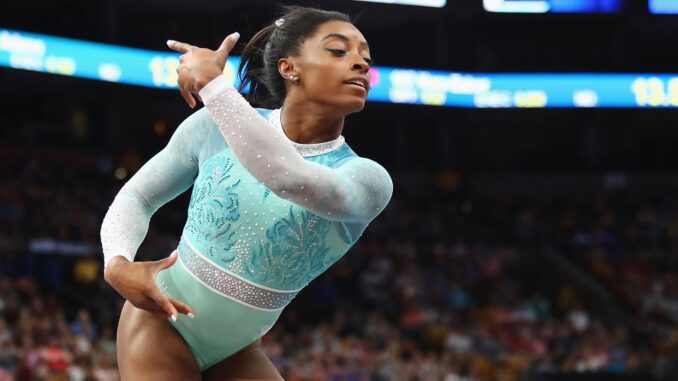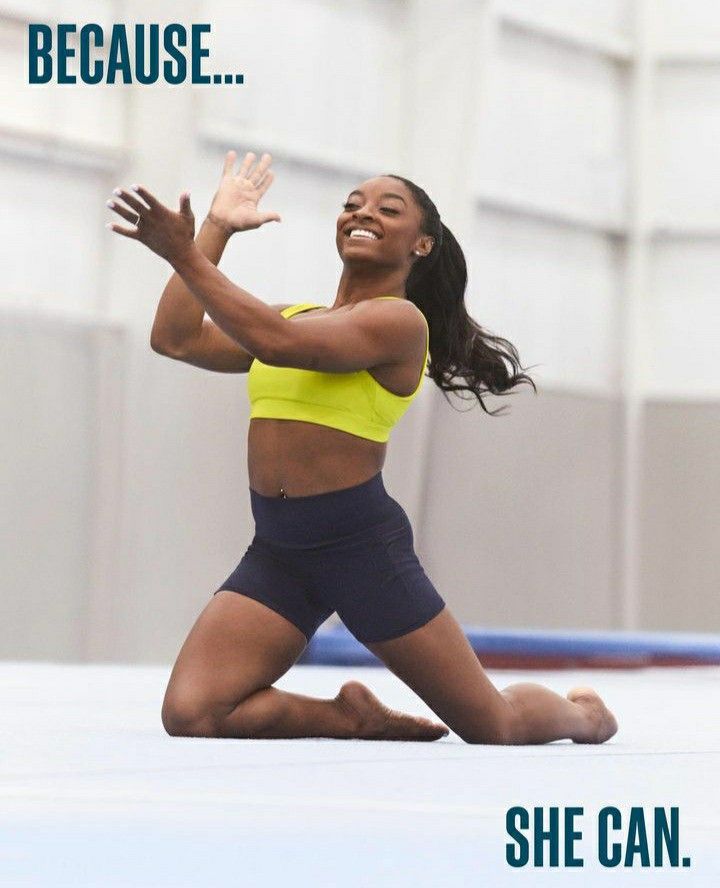
Olympic gymnastics champion Simone Biles is going head-to-head with one of the most vocal opponents of transgender girls and women competing in female sports, former college swimmer Riley Gaines. Biles — the most decorated Olympic gymnast is history — called the former college athlete “sick” and a “sore loser” in a post on X Friday night. “You should be uplifting the trans community and perhaps finding a way to make sports inclusive OR creating a new avenue where trans feel safe in sports,” Biles, 28, wrote. “Maybe a transgender category IN ALL sports!!” “But instead… You bully them,” Biles continued. “One things for sure is no one in sports is safe with you around!!!!!”
As a college swimmer, Gaines tied for fifth place in a competition with then-University of Pennsylvania swimmer Lia Thomas, who is transgender, in 2022. Since then, Gaines has largely built a career as a pundit in conservative media advocating against trans women competing in female sports, arguing that it is unfair to include them in competition and their inclusion is at times unsafe for other competitors. Gaines, 25, has also built an enormous following on social media, with over 1.5 million followers on X, where she regularly lambastes and mocks transgender athletes.
On Friday, Gaines posted an image of a Minnesota girls high school baseball team, which supposedly includes a trans player. She appeared to taunt the player, referring to her as a boy, which appears to have elicited Biles’ response. Gaines almost immediately responded to Biles’ criticism in a series of posts on X. “This is so disappointing. My take is the least controversial take on the planet,” Gaines wrote. “Simone Biles being a male-apologist at the expense of young girls’ dreams? Didn’t have that on my bingo card.”
The issues of trans girls and women competing in female sports has become a lightning rod issue in the United States in recent years. In February, President Donald Trump signed an executive order aiming to prohibit transgender women and girls from competing in female sports. Before that, at least 27 states already had laws, regulations or policies banning transgender students from participating in sports consistent with their gender identities, according to the Movement Advancement Project, an LGBTQ think tank.
A War of Words and Values
In today’s climate of social change and vocal activism, even athletes have become powerful voices in political and cultural debates. Recently, Olympic gold medalist Simone Biles took a bold stance, calling Riley Gaines “sick” for her ongoing criticism of transgender athletes.
What started as a disagreement over sports fairness quickly turned into a full-blown ideological showdown. And it’s catching fire across social media and headlines alike. Let’s dive into the context, the clash, the culture war, and what this means for the future of sports — and society.
Who Are Simone Biles and Riley Gaines?
Simone Biles – A Champion On and Off the Mat
Simone Biles isn’t just the most decorated gymnast in history — she’s also a mental health advocate, a survivor, and now, a defender of LGBTQ+ inclusion in sports.
Her voice carries weight. And when she speaks, people listen.
Riley Gaines – From Swimmer to Social Commentator
Riley Gaines, a former NCAA swimmer, rose to prominence not only for her performance in the pool but for her outspoken views against transgender women competing in women’s sports.
She argues it’s unfair and claims cisgender women are being pushed aside.
What Sparked the Feud?
Riley’s Public Comments About Trans Athletes
Gaines has repeatedly voiced concerns that transgender women in sports pose a threat to fair competition. Her viral remarks about swimming alongside Lia Thomas, a transgender athlete, have stirred significant backlash and support in equal measure.
Simone’s Sharp Response
Simone Biles fired back on social media, calling Gaines “sick” for her rhetoric. In her post, Biles emphasized dignity, inclusivity, and humanity, adding that athletes should support each other — regardless of gender identity.
The Bigger Picture: Inclusion vs. Fairness in Sports
The Debate Everyone’s Talking About
The tension between inclusivity and competitive fairness isn’t new — but it’s heating up fast.
Can sports be both inclusive and fair?
Arguments in Favor of Trans Inclusion
-
Human Rights: Advocates argue that transgender athletes have a right to participate in sports aligned with their gender identity.
-
Mental Health Impact: Exclusion can cause psychological harm and societal isolation.
-
Scientific Debate: Not all experts agree that trans athletes have an “unfair” advantage, especially when hormone therapy is involved.
Arguments Against Trans Inclusion in Women’s Categories
-
Biological Advantage: Opponents argue that even with hormone therapy, some transgender women retain physical advantages.
-
Safety & Fairness: Concerns about safety in contact sports and fair records in non-contact events remain prevalent.
Social Media Reacts: Division and Dialogue
Simone’s Supporters Rally Behind Her
Fans flooded Twitter and Instagram with hashtags like #StandWithSimone and #InclusionMatters, praising her bravery and empathy.
Gaines’ Backers Fire Back
On the other side, Gaines’ followers labeled Biles “woke” and accused her of undermining women’s rights. The internet lit up with fierce debates.
Media Coverage & Public Influence
News Outlets Take Sides
Mainstream media mostly sided with Biles, highlighting the need for unity and compassion. However, several conservative commentators supported Gaines, claiming Biles missed the point about fairness.
The Role of Public Figures in Shaping Opinion
When athletes speak, they influence millions — especially young fans. Whether it’s Colin Kaepernick taking a knee or Simone Biles standing up for trans athletes, their platforms have real power.
Mental Health Matters in This Conversation
Simone has been candid about her struggles with mental health, and it’s likely that perspective shaped her response. The ongoing scrutiny and online harassment that both sides receive also raises questions about mental health awareness in public discourse.
Politics, Policy, and the Future of Sports
Laws Are Changing Fast
Several U.S. states have already passed laws restricting trans athletes from participating in women’s sports. These moves are often challenged in court, creating a chaotic and confusing legal landscape.
NCAA and International Sports Bodies Respond
-
The NCAA has implemented hormone-based policies.
-
The International Olympic Committee (IOC) recently shifted focus from testosterone levels to performance evidence.
What Are Other Athletes Saying?
Some Agree With Gaines — Quietly
While some athletes have echoed Gaines’ concerns, many do so off the record, fearing backlash or sponsorship loss.
Others Echo Simone’s Message
High-profile stars like Megan Rapinoe and Billie Jean King have championed trans inclusion, urging sports to evolve with society.
What Does Science Say?
No Clear Consensus Yet
Scientific studies are still catching up. While some indicate performance advantages, others point out that hormone therapy significantly reduces physical disparity over time.
So, the verdict? Still up for debate.

The Human Element: Beyond Stats and Science
At the heart of this debate are real people. Trans athletes aren’t just “policy problems” — they’re individuals trying to compete, belong, and thrive like everyone else.
Simone’s statement didn’t just call Gaines “sick” — it was a broader message to center humanity in these discussions.
Final Thoughts: Why This Moment Matters
This isn’t just a spat between two athletes — it’s a flashpoint in a cultural and political reckoning. As lines are drawn and opinions fly, we must ask:
Are we building walls or bridges?
Simone Biles’ voice reminds us that kindness, empathy, and inclusion still matter — even when it’s uncomfortable. Especially then.